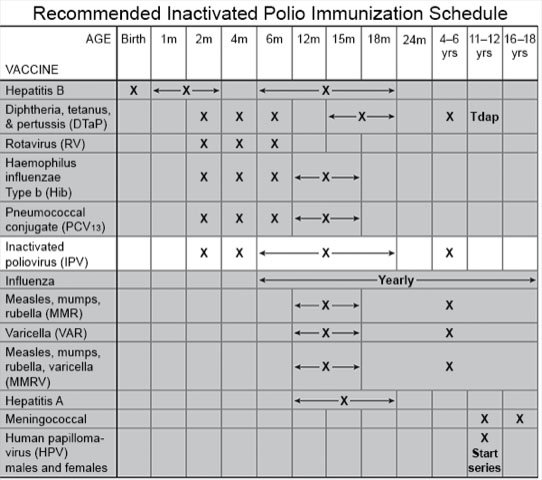Inactivated Polio Vaccine for Children
Medically reviewed by Drugs.com. Last updated on Aug 4, 2025.
What is the inactivated polio vaccine (IPV)?
The IPV is an injection given to help prevent polio. Polio is a disease caused by a virus. The virus damages the brain and spinal cord. This can lead to paralysis or death. The virus is usually spread through direct contact. The IPV is often given with hepatitis B, pneumococcal, DTaP, and Hib vaccines. Your child may need these or other childhood vaccines at certain ages.
When should my child get the IPV?
The first dose may be given to infants as young as 6 weeks. Infants and children usually get a 4-dose series:
- The first dose at 2 months
- The second dose at 4 months
- The third dose at 6 to 18 months
- A booster shot at 4 to 6 years
 |
What should I do if my child misses a dose of the IPV?
Ask your child's healthcare provider when to bring your child in for a catch-up dose.
What are reasons my child should not get the IPV?
- Your child had an allergic reaction to a dose of the vaccine.
- Your child has an allergy to latex or certain antibiotics, such as neomycin, streptomycin, or polymyxin B.
Related medications
What are reasons my child may need to wait to get the IPV?
- Your child is sick or has a fever. Wait until your child feels better and the fever is gone.
- Your adolescent is pregnant or breastfeeding. The vaccine may be given if your adolescent's risk for polio is high.
Call your local emergency number (911 in the US) for any of the following:
- Your child's mouth and throat are swollen.
- Your child is wheezing or has trouble breathing.
- Your child has chest pain.
- Your child's heart is beating faster than normal for him or her.
- Your child feels like he or she is going to faint.
When should I seek immediate care?
- Your child's face is red or swollen.
- Your child has hives that spread over his or her body.
- Your child has severe shoulder pain.
When should I call my child's doctor?
- Your child feels weak or dizzy.
- Your child has a high fever.
- Your child has increased pain, redness, or swelling around the area where the shot was given.
- You have questions or concerns about the IPV.
Care Agreement
You have the right to help plan your child's care. Learn about your child's health condition and how it may be treated. Discuss treatment options with your child's healthcare providers to decide what care you want for your child. The above information is an educational aid only. It is not intended as medical advice for individual conditions or treatments. Talk to your doctor, nurse or pharmacist before following any medical regimen to see if it is safe and effective for you.© Copyright Merative 2025 Information is for End User's use only and may not be sold, redistributed or otherwise used for commercial purposes.
Further information
Always consult your healthcare provider to ensure the information displayed on this page applies to your personal circumstances.
